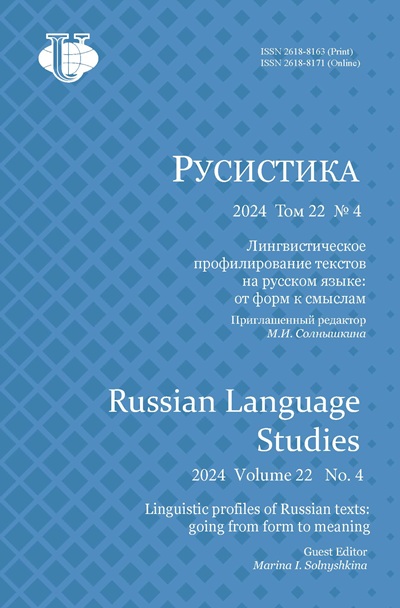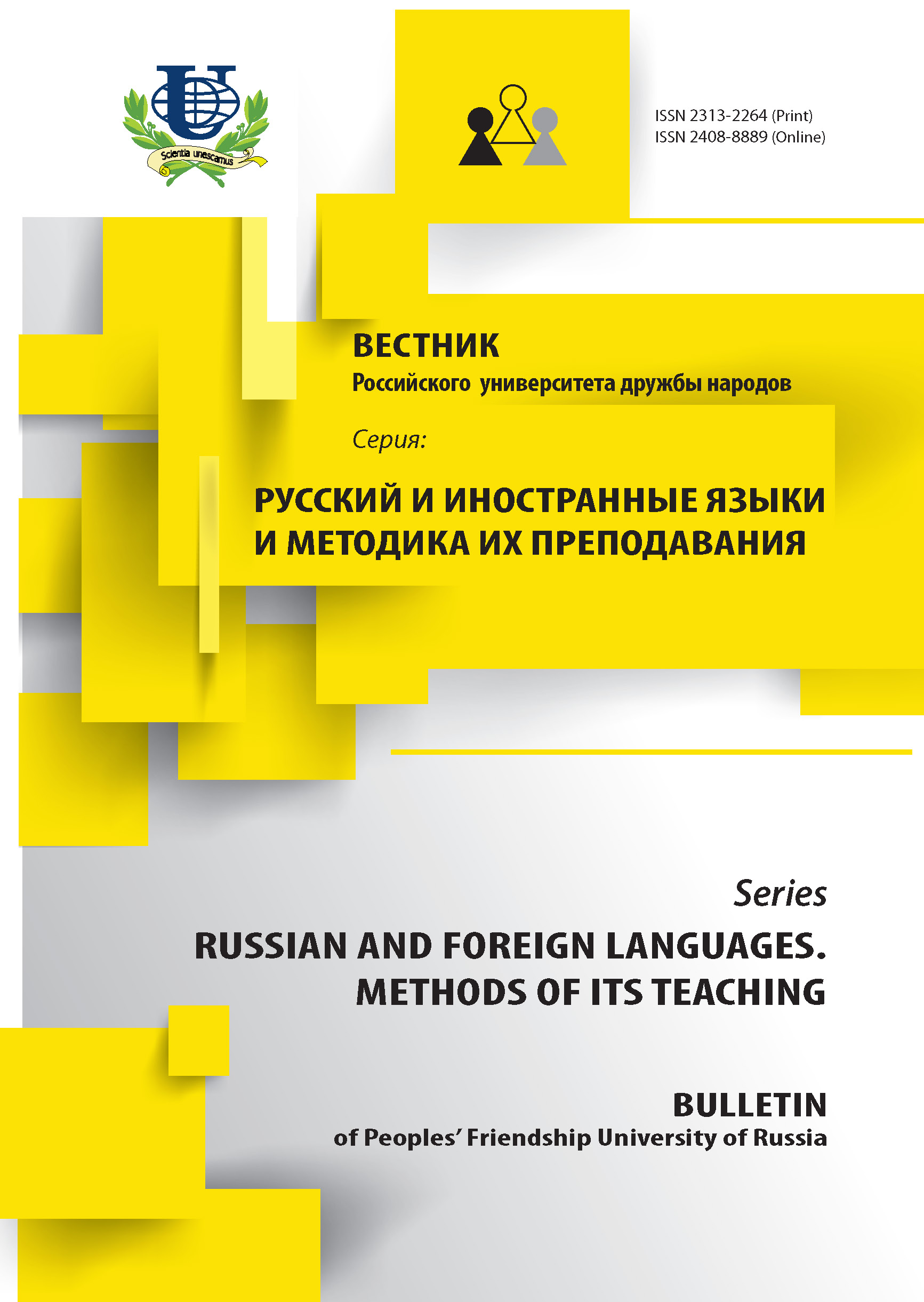№ 4 (2012)
- Год: 2012
- Статей: 22
- URL: https://journals.rudn.ru/russian-language-studies/issue/view/601
Статьи
Когнитивно-прагматические механизмы косвенной номинации
Аннотация
В центре внимания находятся процессы авторского лингвокреативного мышления, порождающего рефлексивные знаки косвенной номинации из имеющегося в данном языке материала и по общим правилам семантической деривации. Показывается обусловленность косвенной номинации фоновой информацией. Ее исследование чрезвычайно ценно для лингвокогнитивной прагматики, лингвокультурологии и психолингвистики.
Русистика. 2012;(4):5-13
 5-13
5-13
 547
547
Билингвальное образование как лингводидактическая версия формирования языковой личности
Аннотация
В статье рассматривается проблема формирования языковой личности в условиях билингвального образования, а также перспективы репродуцирования русской языковой личности через разработку европейской системы подготовки кадров для зарубежных учебно-воспитательных заведений, где в качестве одного из языков обучения фигурирует русский язык.
Русистика. 2012;(4):14-20
 14-20
14-20
 769
769
Этнокультурная адаптация иностранных учащихся к условиям жизни и обучения в России
Аннотация
В статье рассматриваются вопросы этнокультурной адаптации иностранных учащихся к условиям жизни и обучения в России. Анализируется феномен культурного шока, описываются причины, симптомы и стадии культурного шока, предлагаются способы преодоления культурного шока.
Русистика. 2012;(4):21-27
 21-27
21-27
 351
351
Структура культурного концепта «город» и его языковая репрезентация в поэзии В. Брюсова
Аннотация
В статье исследуется структура культурного концепта «город», дана его лексическая экспликация и репрезентация через когнитивные слои и семантические поля в поэзии В. Брюсова. Концепт «город» рассматривается как когнитивная структура комплексного типа, включающая различные концептуальные модели, признаки, сигнатуры, что позволяет раскрыть специфику авторского идиостиля.
Русистика. 2012;(4):28-35
 28-35
28-35
 484
484
Метафоры родства как способ осмысления концепта «душа» в русской лингвокультуре
Аннотация
В статье рассматривается специфика метафор родства и их роль в концептуализации души. Делается вывод, что с помощью подобных метафор может быть представлена духовная близость, эмоциональная и религиозная жизнь человека. Продуктивность данных метафор определяется особенностями русской лингвокультуры.
Русистика. 2012;(4):36-43
 36-43
36-43
 464
464
 44-49
44-49
 523
523
 50-55
50-55
 649
649
 56-61
56-61
 544
544
Особенности языковой, структурной и композиционной оформленности текста международного договора (на материале дипломатических документов на русском и болгарском языке)
Аннотация
В статье исследуется структурно-композиционная и языковая оформленность текстов международных договоров. В сопоставительном плане прослеживаются средства и способы достижения межъязыковой лексико-семантической и прагматической эквивалентности договоров. Материалом исследования послужили двусторонние дипломатические документы, подписанные за последние 20 лет между Российской Федерацией и Республикой Болгария.
Русистика. 2012;(4):62-70
 62-70
62-70
 715
715
Семантика аргументации в информационном поле художественного текста
Аннотация
В статье рассматриваются основные особенности семантики аргументации, ее функциональная значимость и способы ее репрезентации в структуре текста как основной единицы коммуникации. На материале фрагментов произведений русских писателей выявлены и описаны различные формы выражения сопоставительной, оценочной, иллюстративной и других вариантов аргументации в моменты порождения и восприятия речи, а также элементы лингвистического анализа текстовых компонентов.
Русистика. 2012;(4):71-76
 71-76
71-76
 534
534
 77-84
77-84
 475
475
Национально-культурные особенности вербальных и невербальных средств аргументации в арабском официально-деловом стиле общения
Аннотация
В статье представлено описание особенностей вербальных и невербальных средств аргументации, принятых в арабском деловом стиле, изучены проблемы построения адекватного «диалога культур», подробное описание и объяснение которых помогут в общении специалистам по арабскому языку и культуре, дипломатам и бизнесменам в соответствии с правилами, принятыми в арабских странах. Внимание уделено изучению национально-культурных особенностей представителей арабской социокультуры и их отражение в официально-деловой сфере. Сформулированы факторы, влияющие на установление и развитие партнерских отношений с представителями арабских государств. Кратко описаны основные моральные ценности, культурно-национальные языковые и поведенческие нормы, знание которых способствует успешному ведению межкультурной коммуникации на уровне «Восток—Запад».
Русистика. 2012;(4):85-90
 85-90
85-90
 995
995
Логическая компетентность оратора как фактор в практике аргументации: история вопроса и современная практика
Аннотация
Рассматривается взаимодействие двух древнейших дисциплин, в рамках которых разрабатывалась античная и современная теория языка, — риторика и логика. Взаимодействие данных дисциплин находило выражение прежде всего в том, что риторическое искусство заимствовало приемы дедуктивной демонстрации, детально разработанные в формальной логике. Автор статьи подчеркивает, что формально-логические приемы имеют универсальную область применения. В статье приведены примеры использования приемов дедуктивной демонстрации в работах создателя экспериментальной науки Нового времени Галилея и российского ученого XX в., основателя отечественной школы механики грунтов Н.М. Герсеванова.
Русистика. 2012;(4):91-97
 91-97
91-97
 426
426
Аргументированная постановка вопросов национальной безопасности в СМИ Иордании
Аннотация
В статье представлено описание современных средств массовых коммуникаций. Рассматривается их влияние на обеспечение национальной безопасности государства. Исследовано состояние современных СМИ арабского государства в эпоху глобализации (на примере Иордании): широко освещено понятие «национальная безопасность», изучены работы арабских ученых в области массовых коммуникаций и роли СМИ в обеспечении национальной безопасности, представлены характеристики современных СМИ Иордании, рассмотрены внутригосударственные проблемы Иордании, решаемые с участием средств массовой информации.
Русистика. 2012;(4):98-105
 98-105
98-105
 478
478
«Дедуктивный способ» поэтико-философской аргументации деталей «достоевского» текста (к проблеме преподавания русской литературы как «неродной»)
Аннотация
В статье предпринимается проверка методом дедукции функционирования деталей «биографического автора» в едином пространстве художественного — конкретно «достоевского» текста. Данная методика выражает оригинальную идею о существенной роли биографического метода литературоведения как «основания» в процессе дедуктивного поиска ключевых поэтико-психологических особенностей, определяющих как содержательную, так и формальную составляющую того или иного литературного текста как целостного духовно-культурного феномена. В процессе рассуждений осуществляется междисциплинарный синтез — риторики, литературоведения, психологии и в некоторой степени медицины, а также методики преподавания русской литературы в иностранной аудитории у носителей иной культурной ориентации.
Русистика. 2012;(4):106-113
 106-113
106-113
 514
514
 114-117
114-117
 464
464
 118-122
118-122
 531
531
Обучение иностранных студентов способам аргументации на примере прозведения А.В. Вампилова «Страший сын»
Аннотация
Статья посвящена обучению способам аргументации студентов, изучающих русский язык как иностранный. В качестве примера приведены отрывки из произведения А.В. Вампилова «Старший сын», которые содержат разнообразные вербальные средства выражения убеждения, характерные для русского языка, раскрывают ментальность, особенность мышления и мировосприятия русского человека.
Русистика. 2012;(4):123-127
 123-127
123-127
 433
433
Роль аргументации при изучении темы «Вежливый отказ» в школьном курсе русского языка
Аннотация
Статья посвящена вопросу использования аргументации при обучении школьников культуре речевого общения. Вежливая форма отказа в ответ на просьбу невозможна без убедительных доводов коммуникантов. Описаны эффективные методические приемы и виды тренировочных упражнений, направленных на достижение цели учебного занятия.
Русистика. 2012;(4):128-132
 128-132
128-132
 522
522
Интеллектуальная игра как компонент образовательных технологий в курсе преподавания дисциплины «Иностранный язык» в техническом вузе
Аннотация
Статья рассматривает методический, образовательный и воспитательный потенциал игровых технологий в практике преподавания иностранного языка в техническом вузе. Утверждается, что интеллектуальная игра, объединяя компоненты ролевой и деловой игры, является эффективным стимулом для изучения иностранного языка и, вместе с тем, показателем степени сформированности языковых знаний и умений.
Русистика. 2012;(4):133-139
 133-139
133-139
 298
298
Особенности конфессионального образования немцев-колонистов южных регионов Российской империи в ХIХ в
Аннотация
Специфика образовательно-воспитательной деятельности немцев-колонистов различных конфессий (лютеран, католиков и менонитов) в южных регионах Российской империи в ХIХ в. заключалась в сохранении моральных принципов и традиций внутри общины, а также насыщенности содержания образования профессиональной направленностью, которая, несмотря на нестабильность политической ситуации, способствовала подготовке кадров, внесших достойный вклад в развитие экономики, науки и культуры страны. Таким ообразом, не утрачивает своей актуальности педагогическое наследие различных этносов в истории развития и становления современной системы образования.
Русистика. 2012;(4):140-149
 140-149
140-149
 349
349
Наши авторы
Русистика. 2012;(4):150-151
 150-151
150-151
 329
329













